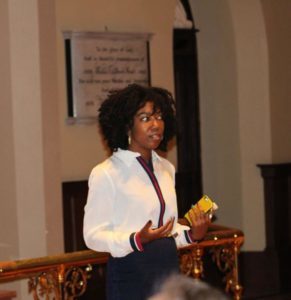[vc_row][vc_column][vc_column_text] The Center offers a variety of events and speakers to explore the history of slavery, the slave trade and its legacies. These presentations are often in collaboration with or hosted by one of our partners or an organization that shares our mission.
The Center offers a variety of events and speakers to explore the history of slavery, the slave trade and its legacies. These presentations are often in collaboration with or hosted by one of our partners or an organization that shares our mission.
We believe that history matters in this work, and all of our programming includes a historical component. Racial reconciliation in our society is held back in large part by powerful myths about our history and about race today. Confronting these myths means passing through a learning crisis which must be guided by knowledgeable, skilled, and sensitive facilitators. Our speaker series introduce people to these myths and gently invite them into the more challenging process of confronting them. We strive to overcome these myths because they are transformative and empowering, and in order to engage more people in the hard work of racial reconciliation.
The historical components of our educational programs and thus of the speaker series focus on these themes such as:
-
- Slavery and the slave trade, especially in the North
- The depth and variety of complicity of white people and institutions in slavery and the slave trade
- How slavery ended and emancipation proceeded, including white resistance and the agency of black Americans, and the consequences for our later history
- How gradual progress towards civil rights and racial equality has proceeded since slavery ended, and with what results
The contemporary components include themes such as:
-
- The nature of racism and racial bias today
- How to understand institutional and structural racism, white privilege, and microaggressions
- The role of complex emotions
- How history plays a role in all of this, and what history teaches about how to move forward together
- The ways in which each of us can help make progress towards racial reconciliation
The learning process with regard to the history and legacy of race is complex and challenging: learners can be expected to cling to comforting myths and to believe they aren’t implicated in what they’re learning. Dialogue is essential in this work, and our speaker series events include opportunity for participant dialogue. Dialogue facilitates the learning process and starts the process of sharing and engaging in difficult conversations. Dialogue is facilitated and follows ground rules to ensure participants are treated with respect and offered as safe a space as possible for holding difficult conversations. We seek to foster unity, not division: reconciliation means understanding and accepting all of God’s children and bringing them together in healing dialogue and in growing relationship with one another
Check our Events page for upcoming offerings in the Speaker Series.[/vc_column_text][/vc_column][/vc_row]
